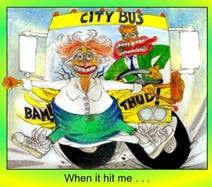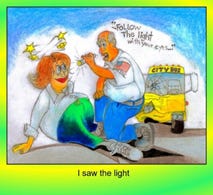Federalist Papers: Translation v. Original Text
I always want people to feel comfortable when they read my “translations” of The Federalist Papers. That’s why I spend time explaining the translation process. And I have a fun example of how easy translation errors can occur.
Before I share it, I give credit to the authors of The Federalist Papers. They do a wonderful job explaining the difficulty faced by every writer and/or interpreter (translator).
“…Humans use words to express ideas. Clear expression requires well-formed ideas and the appropriate words. But no language has words and phrases for every complex idea. And many words have several meanings. Therefore, the definition of even a precise subject can be inaccurate because words are inaccurate. This unavoidable inaccuracy grows worse as the subject becomes more complex or novel.
“When God, Himself, talks to mankind in our language, His meaning—brilliant as it must be—is made dim and doubtful by the cloudy medium through which it is communicated.
“There are three sources of vague and incorrect definitions: (1) indistinctness of the subject, (2) the brain’s imperfections, and (3) the language’s inadequacies. When the constitutional convention worked to define the boundary between federal and State jurisdictions, it must have experienced all three problems.”
Federalist Paper #37 [paragraphs 10-11]*
Translating is much more than substituting a word in one language for a word in a second language. The translator must pick the correct meaning by looking at the context of the entire message. When I began translating The Federalist Papers, I was doing it for my own information. It was an incredibly slow process. I began my first translation in December, 1994, and finished in July, 1998. I was a couple of years into the process when I realized that other people could benefit from my work.
My first translation of The Federalist Papers was still college reading level. I published my 10th-grade reading level edition in 2008. I had a constitutional scholar double check this translation before I published it, making sure that I conveyed the exact message.
Conveying the exact message is always the goal of the interpreter. I discovered that not everyone understands this goal. I want to share an experience I had more than 25 years ago, when I was interpreting for a deaf couple at the University of Iowa Hospitals and Clinics. A nurse had some information for them. As the nurse talked, I was waiting for her to say her first couple of sentences so that I knew where her message was going. Also, the sentence structure in American Sign Language is different than the sentence structure in English, therefore I needed to hear at least an entire sentence before I start translating.
Suddenly the nurse stopped speaking to her patients and turned to me and said, “Why aren’t you interpreting?”
As an interpreter, my first duty is to my clients. So, I had to start my interpreting with, ‘she-asked-me why me interpreting not.’
Then I had to sign and also speak to the nurse at the same time. This is something that I really try to avoid doing, because it is really hard! And I’m just not that great at it. “Just keep speaking and I will interpret.”
What a mess. I thought of this particular interpreting/translating experience many times over the years. I wanted to come up with a way to explain what I was trying to do to someone who knew nothing about the interpreting process. Since my best friend and partner, Bruce Walker, is an artist, I finally came up with an idea.
We English speakers don’t even realize how often we use idioms. As an American Sign Language Interpreter, I ran into them all the time. But most people rarely even notice them. So, I came up with a story:
“I was bouncing down the street when it hit me—I saw the light! I needed to shape up. I marched into the gym and said, ‘Sign me up!’”
I took this little story to Bruce and asked him to draw pictures of the story, as it was written. He had a little problem with this assignment because he kept seeing the message and not the words. But I finally got him to illustrate my story.
Please enjoy this really bad translation!
*The Federalist Papers: Modern English Edition Two, Webster, 2008.






